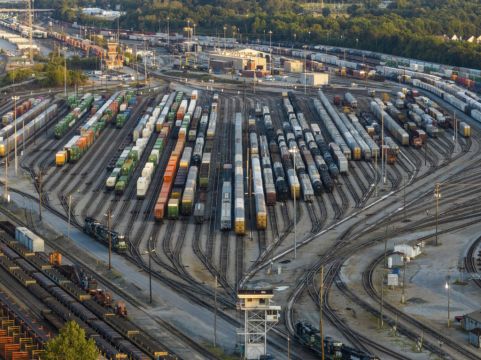The Senate has moved quickly to avert a rail strike that the Biden administration and business leaders warned would have had devastating consequences for the nation’s economy.
The Senate passed a bill to bind rail companies and workers to a proposed settlement that was reached between the rail companies and union leaders in September.
That settlement had been rejected by some of the 12 unions involved, creating the possibility of a strike beginning on December 9.

The Senate vote was 80-15. It came the day after the House of Representatives voted to impose the agreement, and the measure now goes to President Joe Biden’s desk for his signature.
“I’m very glad that the two sides got together to avoid a shutdown, which would have been devastating for the American people, to the American economy and so many workers across the country,” Democratic leader Chuck Schumer told reporters.
He spoke as labour secretary Marty Walsh and transportation secretary Pete Buttigieg emphasised to Democratic senators that rail companies would begin shutting down operations well before a potential strike. The administration wanted the bill on Mr Biden’s desk by the weekend.
Shortly before Thursday’s votes, Mr Biden — who had urged Congress to intervene earlier this week — defended the contract that four of the unions had rejected, noting the wage increases it contains.
“I negotiated a contract no one else could negotiate,” he said at a news briefing. “What was negotiated was so much better than anything they ever had.”

Critics say the contract that did not receive backing from enough union members lacked sufficient levels of paid leave for rail workers. Mr Biden said he wants paid leave for “everybody” so it would not have to be negotiated in employment contracts, but Republican legislators have blocked measures to require time off work for medical and family reasons.
The president said Congress should now impose the contract to avoid a strike that he added could cause 750,000 job losses and a recession.
Railways say that halting services would cause a devastating hit to the economy. A freight rail strike also would have a big potential impact on passenger rail, with Amtrak and many commuter railways relying on tracks owned by the freight railroads.
The rail companies and 12 unions have been engaged in high-stakes negotiations. The Biden administration helped broker deals between the railways and union leaders in September, but four of the unions rejected the deals.
Eight others approved five-year deals and are getting back pay for their workers for the 24% raises that are retroactive to 2020.







